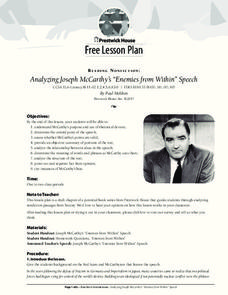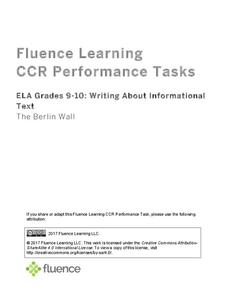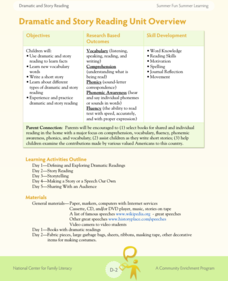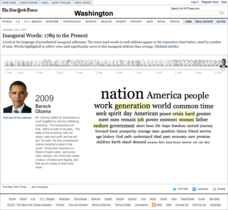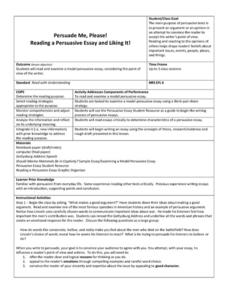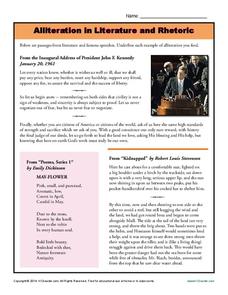Library of Virginia
Life as an Enslaved People
As part of a study of slavery in the United States, class members analyze documents related to the sale of slaves. They consider not only the text of the bills of sale but also what the appearance of the broadsides suggest.
Library of Virginia
Antebellum Freedom
From indentured servitude to involuntary race-based servitude, slavery has taken many forms in American history. Class members examine three manumission petitions that reveal how the rights of African Americans and African American...
ReadWriteThink
Analyzing Famous Speeches as Arguments
A speaker, a message, an audience. After analyzing these elements in Queen Elizabeth's speech to the troops at Tilbury, groups analyze how other speakers use an awareness of events, and their audience to craft their arguments....
Prestwick House
Reading Nonfiction: Analyzing Joseph McCarthy's "Enemies from Within" Speech
Looking for a lesson plan that teaches class members how to analyze nonfiction? Use Joseph McCarthy's famous "Enemies from Within" speech as a instructional text. Worksheet questions direct readers' attention to the many historical...
Fluence Learning
Writing About Informational Text The Berlin Wall
On June 26, 1963 President John F. Kennedy delivered his famous "Ich bin ein Berliner" speech close to the Berlin Wall at the Rudolph Wilde Platz. On June 12, 1987 President Ronald Reagan Delivered his famous "Mr. Gorbachev, tear down...
Prestwick House
Rhetorical Devices in Political Speeches
Have you ever watched a political speech and felt your heart beat a little faster, and your opinion either solidify or begin to slightly change? Rhetorical devices can be a strong tool in an effective and powerful speech. A short lesson...
National Center for Families Learning
The Summer Fun Summer Learning Dramatic and Story Reading Unit
What's the difference between story reading and story telling? Participants in a summer enrichment program learn all about the difference as they listen to famous speeches, engage in dramatic readings, and craft their own short stories...
John F. Kennedy Presidential Library & Museum
Ask Not What Your Country Can Do for You
Ask not what the lesson here can do for you, but what you can do with the lesson. The answer is quite a lot! Young scholars revisit JFK's famous inaugural address with a focus on his plea for civic engagement. There's a letter to JFK...
Read Works
Famous Inventors Alexander Graham Bell: You Rang?
Scholars read a brief informational text about the famous inventor, Alexander Graham Bell and his invention of the telephone, then show what they know by way of eight questions—six multiple choice and two short answer.
Walt Disney Company
Elizabeth Started All the Trouble
Elizabeth Cady Stanton was a famous suffragette that paved the way for equal rights for women. Readers respond to before, during, and after reading questions based on her story. The resource is a great addition to a lesson during Women's...
Teaching American History
A Word Fitly Spoken: Lincoln's Most Famous Speeches on Union
Abraham Lincoln's words carried American democracy through one of its most tenuous and violent moments in the nation's short history. Explore an interactive timeline that places events of the 19th century in the context of Lincoln's...
The New York Times
Inaugural Words: 1789 to the Present
One of the reasons presidential inaugural speeches are so inspiring is the way word choice reflects the historical context of the time. An interactive timeline invites learners to click on their president of choice and view the most...
Civil War Trust
Gettysburg Address
The Gettysburg Address may have been four score and seven years ago, but its message is still as relevant today. Young historians explore the context of the famous speech, as well as its central theme and argument, before discussing the...
MENSA Education & Research Foundation
Utopia/Dystopia: The American Dream
America was founded by dreamers, and the American dream still resonates in our country today. Track the American dream from its Puritan beginnings to its optimistic descendants with a instructional activity that focuses on speeches by...
Curated OER
Persuade Me, Please! Reading a Persuasive Essay and Liking It!
Persuade your writers that crafting arguments is not that difficult. They only need to follow the steps outlined in this resource.
Library of Congress
Determining Point of View: Paul Revere and the Boston Massacre
If you're teaching point of view, this is the lesson plan for you! First, decipher the writer's point of view from a primary resource, then compare and contrast the primary source with a secondary source to explore the Paul Revere's...
English Worksheets Land
Compare and Contrast
Even though two passages discuss the same topic, they contain different facts and details. Scholars analyze two reading passages about the Gettysburg Address and list the ways they are the same and different.
K12 Reader
Alliteration and Tongue Twisters
Did she sell seashells by the seashore, or did Bill buy berries by the ballpark? Practice literary skills with an activity based on famous tongue twisters. Kids replace the nouns, verb, and adjectives in two phrases to create a new...
K12 Reader
Alliteration in Literature and Rhetoric
Middle schoolers are asked to identify the alliteration used in John F. Kennedy's Inaugural Address, Emily Dickinson's "May-Flower," and a passage from Robert Lewis Stevenson's Kidnapped.
Student Handouts
Geography of Dr. Martin Luther King, Jr.
Young geographers follow Dr. Martin Luther King's journey during the civil rights movement by identifying major events on a map of the eastern United States, such as his birth in Atlanta, Georgia and his famous "I Have a Dream" speech in...
Brigham Young University
Bloom’s Taxonomy: Questions for Harry Potter and the Chamber of Secrets
As part of their study of Harry Potter and the Chamber of Secrets, readers respond to a series of questions based on chapter eight of J.K. Rowling's second novel in the series about the famous young wizard.
K12 Reader
MLK: Complete the Speech
Take a close look at a few paragraphs of Martin Luther King, Jr.s' famous speech, "I Have a Dream." Class members fill in the missing words using the bank of words provided and then respond to a question about the speech and modern day...
K12 Reader
I Have a Dream… Personal Narrative: Writing About Your Dream for the World.
How do your pupils want to change the world? Find out with this writing prompt, inspired by Dr. Martin Luther King, Jr.'s well-known speech. The resource provides the prompt and lines for writing.
K12 Reader
Churchill's Speech: We Shall Fight on the Beaches
Winston Churchill speech delivered to the House of Commons on June 4, 1940, is the focus of a comprehension exercise that asks readers to explain how the repetition in the speech supports the main purpose of Churchill's address.
Other popular searches
- Famous Speeches About Heroes
- Famous Speeches Literature
- Famous Speeches Project
- Studying Famous Speeches
- Lessons on Famous Speeches
- Famous Speeches of President
- Giving Famous Speeches
- Famous Speeches About Heros
- Researching Famous Speeches
- Famous Speeches Revolution





